 “A good leader takes a little more than his share of the blame, a little less than his share of the credit.”—Arnold H. Glasow
“A good leader takes a little more than his share of the blame, a little less than his share of the credit.”—Arnold H. Glasow
Mistakes happen. A big part of how you are perceived as a leader will be based on how you deal with not only your mistakes, but the mistakes of those who work for and with you. Playing the blame game is all about internal politics and saving face. Well, the results you think you are getting from playing the game may not reflect the actual impact that the game is having on your leadership.
How you think it makes you look
When you blame others for mistakes, regardless of where they were made, you think it boosts your credibility and undermines the competence of others. You think that it increases your power because, in your mind, you have everyone convinced that you are the only one who knows anything or can do anything right. The bottom line is, you think that by blaming others, it makes you look good and others look bad.
How you really look
When you play the blame game you send the clear message that you cannot be trusted. Game players will turn on anyone and everyone to make themselves look good. The truth is, it shows that you are untrustworthy, it demonstrates your lack of self-confidence, and undermines the respect others have for you. The need to point fingers guarantees that you are not a leader who inspires and influences. On the contrary, it shows that you are manipulative and self-serving; not worthy of the title of leader at all.
It’s not about you
Leadership is not about you, as the leader, looking good. It’s about you helping the people who work for you do their best work so they can look good. This is the true measure of leadership. Mistakes will happen and they must be addressed and corrected. But, they do not need to be shouted from the street corner. They also don’t need to be whispered about behind other’s backs. You do not need to have your fingers in everything just waiting for someone to make a mistake so you can pounce. If you are undermining others for your own hidden agenda, you are making it about you and you do not deserve the title of leader.
How Do You Stop?
Start by evaluating the way you operate. Are you hoarding information that employees need in order to do their jobs? If you are, this shows insecurity on your part. It is a move to keep all the power for yourself. By doing this, you are the one who is accountable for mistakes that are made due to lack of or incorrect information.
Develop the attitude that we all succeed or fail together. How can we make sure that everyone has access to the information they need? How can we insure that everyone has the training that they need? Is everyone kept in the loop so we are all on the same page?
Stop pointing fingers and definitely stop sharing information on employee performance with others. When you run to your colleagues, pointing out every mistake that is made and blaming it on someone else in an attempt to make yourself look better, you actually become the tattletale who takes no personal responsibility for the operations of your department. It makes everyone look bad including you.
Watch your approach to dealing with perceived mistakes. Stop jumping to conclusions, pointing fingers, and making accusations. Nothing makes you look worse than making assumptions and acting on those assumptions just to find out that you are the one who is mistaken. Instead, approach others by saying “I’m confused. Can we take a look at this together?” This approach leads to teamwork where you are working together to figure out what is right, what is wrong, and what needs to be done to make corrections. In this scenario, everyone comes out looking and feeling good.
Start focusing on the good. Give employees credit for a job well done. When employees do not get the credit for what they do well, they will not give you 100%. When they see that they shoulder the blame for EVERYTHING that goes wrong, they will not give you 100%. And, when you do not acknowledge your mistakes or the role you may play in the mistakes of others, you will lose the trust and respect you need to be an effective leader.
Everyone makes mistakes. The key to success as a leader is sharing the lessons learned in a way that encourages employees rather than undermining their confidence by pointing fingers. The focus should be on how you are going to move forward and correct the mistake. As a leader, it is your responsibility to guide and support others. If you are capitalizing on the mistakes of others to make yourself look more competent; more powerful; and more in control, you ARE NOT a true leader. Stop playing the blame game.
© 2017 Elizabeth Stincelli
Liz Stincelli is passionate about recognizing and inspiring the leader in each of us. She is the Founder of Stincelli Advisors where she focuses on helping organizations change attitudes, change communication dynamics, improve collaboration and problem-solving, engage employees, and strengthen organizational culture. Liz holds a Doctor of Management degree with an emphasis on organizational leadership.
Learn more about Liz by visiting her website, stincelliadvisors.com and connect with her on Twitter @infinitestin, Google+, and LinkedIn. You can contact her by email at stincelliadvisors@gmail.com.
